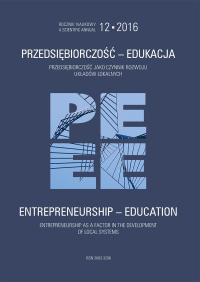Native E-tourism as an Opportunity for Development of Entrepreneurship in Local Communities
DOI:
https://doi.org/10.24917/20833296.12.18Keywords:
e-tourism, internet portal, local communities, native tourism, sustainable tourismAbstract
Native tourism as an individual and non-institutionalized, non-formalized form of exploring the world belongs to the modern trends of tourism development, including sustainable tourism, ethnic tourism or slow tourism. This type of tourism has, among other things, designed to promote the economic development of local communities and refers to the policy of pro-poor tourism. Tools commonly used in e-tourism became also useful for native tourist services. The combination of these two trends in tourism: native tourism and e-tourism, may become the basis for the development of online information systems within native e-tourism. Such systems, from their nature, could help in the realization of individual and qualified tourists’ needs and interests as well as in facilitating the dissemination of offers by local suppliers of various, niche types of tourist services. The article is a key study and describes the concept of the Native E-Tourism and its relation to other forms of sustainable tourism. It also shows principles of the ETNOS portal - one of the pioneer Internet portals in native e-tourism that helps in diffusion of a not new but modified concept in tourism.References
Aue, S. (2008). Lifestyle of Health and Sustainability (LOHAS). Eine neue form politischer Partizipation.
Bachelor Thesis. Universitat Siegen. Grin – Verlag fur akademische Texte.
Beeton, S. (2006). Community development through tourism. Cilligwood: Landlinks Press.
Buhalis, D. (2003. eTurism: information technology for strategic tourism management. Prentice Hall.
Butler, R.W. (1999). Sustainable Tourism: a state of the art review. Tourism Geographies, 1(1), 7–25.
Cleverdon, R., Kalisch, A. (2000). Fair Trade In Tourism. International Journal of Tourism Researche, 2, 171–187.
Cohen, E. (1972). Towards a sociology of international tourism. Social Research, 39(1), 164–182.
Czarnecki, A., Luc, M. (2001; 2015, 29 października). Potential input of tourism into economic sustained development in the area of the Baltic Sea – case study of the lower Vistula, Żuławy, Vistula Basin and Elbląg Channel (Poland), Baltic 2001, a regional, IT-based environment conference for the Baltic, organized as part of BEIDS. Pozyskano z: http://www.beids.de/baltic2001/opening.html
Dickinson, J., Lumsdom, L. 2010. Slow travel and Tourism. London: Eathscan.
Ernst&Young (2015, 3 lipca). LOHAS. Lifestyle Of Health And Sustainability. Pozyskano z: https:// www2.eycom.ch/publications/items/2008_lohas/2008_ey_LOHAS_e.pdf Gardner, N. (2015, 29 października), A manifesto for slow travel. Pozyskano z: http://www.hiddeneurope.co.uk/a-manifesto-for-slow-travel
Gaworecki, W.W. (1982). Ekonomika i organizacja turystyki. Warszawa: PWN.
Hunter, C. (1997). Sustainable tourism as an adaptive paradigm. Annals of Tourism Research, 24(4), 850–867.
Hunter, C., Green, H. (1995). Tourism and the environment a sustainable relationships? London: Routledge.
Internetowy słownik języka polskiego PWN, hasło: Etnos. (2015, 29 października). Pozyskano z: http://sjp.pwn.pl/sjp/etnos;2557154
Kowalczyk, M. (2013). Turystyka zrownoważona w małych miastach w świetle badań ankietowych. Człowiek i Środowisko, 37(1–2), 83–96.
Lubowiecki-Vikuk, A.P., Paczyńska-Jędrycka, M. (2010). Współczesne tendencje w rozwoju form rekreacyjnych i turystycznych. Poznań: Bogucki Wydawnictwo Naukowe.
Luc, M. (2015), Approaches in Sustainable‘Landscaping’ – A Geographical Perspective. W: M. Luc, U. Somorowska, J.B. Szmańda (red.), Landscape Analysis and Planning – Geographical Perspective. Springer Geography, 201–216.
Łobożewicz, T., Bińczyk, G. (2001). Podstawy turystyki. Warszawa: Wyższa Szkoła Ekonomiczna.
McIntosh, R.W., Goeldner, C.R. (1990). Tourism principles, practices and philosophies. New York: John Wiley.
Mika, M. (2014). Założenia i determinanty podtrzymywalności lokalnego rozwoju turystyki. Kraków: Wydawnictwo IGiGP UJ.
Nelson, V., Barry, P. (2009). The Last Ten Years: A Comprehensive Review of the Literature on the Impact of Fairtrade. Greenwich: Natural Resources Institute.
Ostrowski, S. (1968). Ruch turystyczny w Polsce. Warszawa: Sport i Turystyka.
Pawlicz, A. (2012). E-turystyka. Warszawa: PWN.
Ray, P., Anderson, R. (2000). The Cultural Creatives. How 50 million people are changing the world. New York: Three RiversPress.
Smith, V.L. (1996). Indigenous Tourism: The Four H’s. W: R.W. Butler, T. Hinch (red.), Tourism and Indigenous Peoples. London: International Thomson Business Press, 283–307.
Spenceley, A., Meyer, D. (2012). Tourism and poverty reduction, theory and practice in less economicaly develop countries. Journal of Sustainable Tourism, 20(3), 297–317.
Stabler, M.J. (1997). Tourism and sustainability: principles to practice. Wallingforde: CAB International.
Wheller, B. (1993). Sustaining the ego. Journal of Sustainable Tourism, 1(2), 121–129.
Williams, P.W., Steward, J.K. (1997). Aboriginal tourism development: Assesing latend demand for France. The Journal of Tourism Studies, 8(1), 25–41.
World Tourism Organization. (1993). Sustainable Tourism Development: Guide for Local Planners. Madrid: WTO.
Zeppel, H. (1998). Land and Culture: Sustainable Tourism and Indigenous Peoples. W: C.M. Hall, A.A. Lew (red.), Sustainable Tourism: A Geographic Perspective. New York: Longman, 60–74.
Torres-Delgado, A., Palomeque, F.L. (2014). Measuring sustainable tourism at the municipal Level. Annals of Tourism Research 49, 122–137.
Downloads
Published
How to Cite
Issue
Section
License
Articles are published under the terms of the Creative Commons License (CC BY-ND 4.0; Attribution– NoDerivs).

